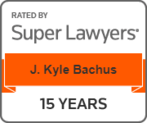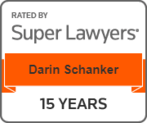Accommodations Under the Americans With Disabilities Act (ADA)
According to the Centers for Disease Control and Prevention (CDC), roughly one in four American adults in the U.S. lives with some type of disability. While disabilities vary in severity, many can make it more challenging for someone to complete the job requirements they once could. This can become especially difficult, if not impossible, without the proper arrangements being met.
Are you or a loved one facing a disability and are worried about not being able to work without changes being made to your work situation? Are you curious about what accommodations your job is required to provide for you under the Americans with Disabilities Act (ADA)?
These rights can all be thoroughly explained in Kyle Bachus’s Amazon best-selling book “Unthinkable.” Order your copy today and, while you wait for your book, check out a quick review of what job accommodations you have a right to under the ADA.
Bachus & Schanker Wins – Over $1 Billion Recovered
- What is the Americans with Disabilities Act (ADA)?
- What makes a person qualify as "disabled"?
- What are considered "reasonable accommodations"?
- Understanding your rights under the ADA
- How working with an employment law attorney can help you
- Employment Law Legal Reviews
- Related Employment Law Resources
- You Deserve Fair Compensation
What is the Americans with Disabilities Act (ADA)?
According to the U.S. Department of Labor (DOL), the Americans with Disabilities Act (ADA) outlaws unfairness and biases towards individuals with disabilities in the following areas:
- Employment access and opportunities.
- Public transportation access.
- Access to public spaces.
- Communications.
- Equal access to programs and services provided by the government (on both the federal and state levels).
Title 1 of the ADA protects disabled employees’ rights for those who are actively employed and for those applying for jobs.
According to The Equal Employment Opportunity Commission (EEOC), Title 1 also makes it illegal for your boss to ask you whether you have a condition or about any specific details pertaining to such a condition. Title 1 also makes it illegal for your boss to disclose to anyone that you have a condition if they learn about it via a job-required medical examination or otherwise.
What makes a person qualify as “disabled”?
According to the EEOC, someone is disabled when they have a bodily or mental impairment that substantially limits major life activity(s). This also includes those who have a history of such an impairment. Once an employee is determined to have a disability, the employer is responsible for making reasonable accommodations.
What are considered “reasonable accommodations”?
According to the EEOC, when a person is qualified for the position for which they are applying, or they are already an employee, the company is required to make reasonable accommodations to assist with issues that an employee may have due to a disability. This is the case as long as the accommodation does not impose an “undue hardship” on the business.
These accommodations will vary, depending on the disability, but could consist of things such as:
- Ensuring that current workplaces are functional for people with disabilities.
- Revising breaks, hours, and assignments to accommodate taking medications or attending doctor’s appointments.
- Buying or adapting work materials, examinations, rules, and training materials to accommodate disabilities.
- Providing trained interpreters or readers for blind or deaf employees.
Understanding your rights under the ADA

According to the U.S. Department of Justice, the ADA makes it illegal for employers with 15 or more employees to discriminate against those who are qualified for a position but have a disability. This covers all aspects of being hired, promoted, properly trained, attending social services, receiving equal pay, and any other advantages of employment.
The ADA has been around since 1990 and, while most things remain the same such as requiring ramps, handicapped bathroom stalls, elevator access, etc., these types of laws must evolve as our world changes. For example, the U.S. Department of Justice released guidelines in 2022 for how agencies run by the government and businesses should make their web content more utilizable for individuals with disabilities. Since the laws are constantly adapting, it is essential to hire an attorney who is up to date with the current laws and regulations.
Examples of unfair treatment:
- Refusing to hire someone who is disabled despite the candidate meeting qualifications.
- A boss who is being shady with subminimum wage or minimum wage issues.
- Failing to make reasonable accommodations for a disability.
- Not making the job application process accessible.
How working with an employment law attorney can help you

If you’ve been concerned that you or a loved one has been taken advantage of by unfair employment practices, hiring an employment attorney is likely your best option. You have the rights under the ADA that strike down such biases. Whether it’s to help you file a complaint or a lawsuit against your workplace, seeking legal advice from an employment law attorney is the best way to ensure you are accommodated. An attorney will help you better understand labor laws, your rights under the ADA, and the best way to move forward. They are the best bet to get you the compensation you deserve.
Facing a disability can be devasting. It can quickly become even more challenging if working has become difficult and your employer isn’t making reasonable accommodations. When you’re facing the fight to make your current workplace or a new workplace more accessible for the disabled, it is always best to hire an employment law attorney. Contact Bachus & Schanker today for a free consultation.
Citations:
A Guide to Disability Rights Laws. (2020).
Americans with Disabilities Act.
Disability Impacts All of Us. (2022).
Fact Sheet: Disability Discrimination.
Justice Department Issues Web Accessibility Guidance Under the Americans with Disabilities Act. (2022).
Visit our Denver Office
950 17th Street, Suite 1050
Denver, CO 80202
Fax: 303-893-9900
Employment Law Legal Reviews
Related Employment Law Resources
You Deserve Fair Compensation
Don’t let the insurance companies intimidate you into accepting less than you deserve. We’re ready to fight for you.

Written and Legally Reviewed By: Kyle Bachus
![]() 4.6 ★★★★★ 1,461 Google Reviews
4.6 ★★★★★ 1,461 Google Reviews
Kyle is a member of the Colorado and Florida Bar associations and has served on the Board of Directors of the Colorado Trial Lawyers Association for more than twenty years in total. Over the years, Kyle has achieved justice for many clients. He has served on numerous committees and repeatedly won recognition from his peers at both the state and national level. He is proud of the role he has played in the passage of state and national legislation to protect consumers and is a frequent speaker and guest lecturer.









